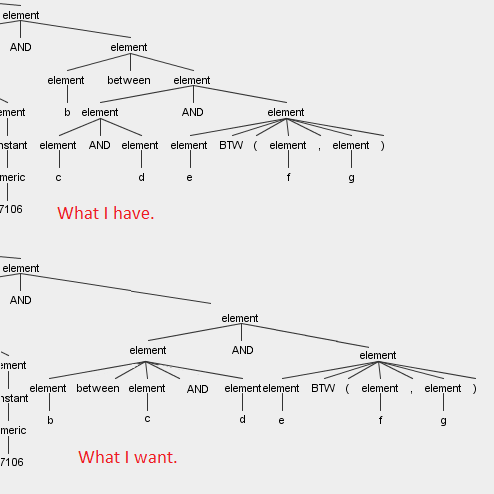I am having a problem while parsing some SQL typed string with ANTLR4. The parsed string is :
WHERE a <> 17106
AND b BETWEEN c AND d
AND e BTW(f, g)
Here is a snippet of my grammar :
where_clause
: WHERE element
;
element
: element NOT_EQUAL_INFERIOR element
| element BETWEEN element AND element
| element BTW LEFT_PARENTHESIS element COMMA_CHAR element RIGHT_PARENTHESIS
| element AND element
| WORD
;
NOT_EQUAL_INFERIOR: '<>';
LEFT_PARENTHESIS: '(';
RIGHT_PARENTHESIS: ')';
COMMA_CHAR: ',';
BETWEEN: B E T W E E N;
BTW: B T W;
WORD ... //can be anything ... it doesn't matter for the problem.

(source: hostpic.xyz)
But as you can see on that same picture, the tree is not the "correct one".
ANTLR4 being greedy, it englobes everything that follows the BETWEEN in a single "element", but we want it to only take "c" and "d".
Naturally, since it englobes everything in the element rule, it is missing the second AND of the BETWEEN, so it fails.
I have tried changing order of the rules (putting AND before BETWEEN), I tried changing association to right to those rules (< assoc=right >), but those didn't work. They change the tree but don't make it the way I want it to be.
I feel like the error is a mix of greediness, association, recursivity ... Makes it quite difficult to look for the same kind of issue, but maybe I'm just missing the correct words.
Thanks, have a nice day !
